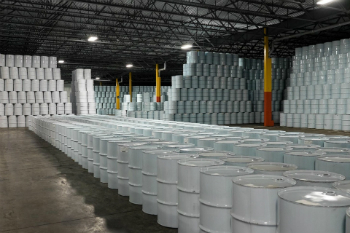We ask you, humbly: don't scroll away.
Hi readers, it seems you use Catholic Online a lot; that's great! It's a little awkward to ask, but we need your help. If you have already donated, we sincerely thank you. We're not salespeople, but we depend on donations averaging $14.76 and fewer than 1% of readers give. If you donate just $5.00, the price of your coffee, Catholic Online School could keep thriving. Thank you.Help Now >
BIG SYRUP? Canada has a Strategic Reserve of --Maple Syrup
FREE Catholic Classes
It's called the Global Strategic Reserve, and it is one of the most important warehouses in the world. White barrels are lined up and stacked and guarded by no security whatsoever. It's also the center of a developing political debate in Canada. What is happening in a quiet town in Quebec that is of interest to the world?

The Global Strategic Reserve of maple syrup actually exists, and it's a bigger deal than most imagine.
Highlights
Catholic Online (https://www.catholic.org)
6/20/2017 (6 years ago)
Published in Americas
Keywords: Canada, Strategic Reserve, syrup
LOS ANGELES, CA (California Network) -- The Global Strategic Reserve is the name of a warehouse in the small town of St. Pierre. Rows and stacks of white 55-gallon drums fill the facility which is entirely unguarded. What is in these drums is fueling a growing debate in the province of Quebec, Canada.
Is it oil? Toxic waste? Some essential item required for national defense? It's none of these things. It's maple syrup, the real kind, not the imitation kind that most people buy in stores.
Maple syrup is a major component of culture in Quebec, and it is a challenge to produce. Maple syrup comes from the sap of maple trees, and it is only harvested during a short season of the year in late winter. The weather must be ideal, with freezing nights and warm days. Nature is fickle; some years are excellent, others are poor.
Maple syrup production used to be a supplement to farmer's incomes, a bonus crop that wasn't always worth the labor, but still paid off enough to keep people interested. The season for maple syrup is a regional tradition celebrated with festivals and family gatherings.
In 1966, farmers developed a plan to moderate their losses by forming the Federation of Quebec Maple Syrup Producers. They developed a scheme whereby all maple syrup would be harvested and handed to the Federation; then it would be sold and turned into syrup. Producers would be paid based on what was sold, and any surplus would be stored for use in lean years.
The Federation's scheme worked, and in 1990 it was granted increased powers to control the traffic in syrup. It now controls 71 percent of the world trade, worth hundreds of millions of dollars.
The scheme also means that farmers no longer compete with one another to sell their syrup. Everything is shipped to the Federation which handles the rest.
The entire scheme, which is very socialist in nature, seems to work well enough that most producers are satisfied with it. However, there is a small number of individuals who want the right to sell their own syrup. They are upset they are not paid for their syrup until it is sold, which means a good year, which means a lot of extra work, may not be paid until a future year.
Some producers are owed thousands of dollars for syrup they have shipped off, but the Federation has not sold. They compare the Federation to the mafia.
These disgruntled producers, which may be just 70 out of a federation of 7,300 producers, are suing for the right to sell their own syrup. Some go rogue and sell it themselves, but face punishing fines for doing so. The Federation has the backing of state law.
However, if people become independent producers, then it could jeopardize the Federation's control. Independent producers would compete and could undercut Federation sales.
High prices have induced many producers into the market, including the United States. American syrup, which does not face regulation, is starting to compete with the Federation. The Federation may soon have to choose between emptying its warehouse and flooding the market with syrup or lowering prices, which means producers will receive less money for their work.
The legal and economic challenges continue. Meanwhile, most of the world, and in the United States, in particular, people continue to consume cheap, imitation, maple-flavored sugar-water that has been thickened to the consistency of syrup and has no maple at all. The lack of taste and appreciation for the genuine product may be the greatest problem of them all, for if people were to give up the cheap imitations, the market would have plenty of demand, and all producers would be rewarded, Federation or no.
Subscribe Now - Catholic Online YouTube
---
'Help Give every Student and Teacher FREE resources for a world-class Moral Catholic Education'
Copyright 2021 - Distributed by Catholic Online
Join the Movement
When you sign up below, you don't just join an email list - you're joining an entire movement for Free world class Catholic education.
-

-
Mysteries of the Rosary
-
St. Faustina Kowalska
-
Litany of the Blessed Virgin Mary
-
Saint of the Day for Wednesday, Oct 4th, 2023
-
Popular Saints
-
St. Francis of Assisi
-
Bible
-
Female / Women Saints
-
7 Morning Prayers you need to get your day started with God
-
Litany of the Blessed Virgin Mary
Pope Francis Explores the Spiritual Legacy of St. John Paul II
-

Robert F. Kennedy Jr.'s Proposes Daycare Plan to Reduce Abortions in America
-

A Grandparent's Love: 3 Bible verses to read to grandchildren
-
Pope Francis to Host Grandparents and Grandchildren at Vatican
-
Simple Steps to Celebrate Earth Day the Catholic Way
Daily Catholic
 Daily Readings for Thursday, April 25, 2024
Daily Readings for Thursday, April 25, 2024 St. Mark: Saint of the Day for Thursday, April 25, 2024
St. Mark: Saint of the Day for Thursday, April 25, 2024 Prayer for Policemen: Prayer of the Day for Thursday, April 25, 2024
Prayer for Policemen: Prayer of the Day for Thursday, April 25, 2024- Daily Readings for Wednesday, April 24, 2024
- St. Fidelis of Sigmaringen: Saint of the Day for Wednesday, April 24, 2024
- A Prayer for Special Intentions: Prayer of the Day for Wednesday, April 24, 2024
![]()
Copyright 2024 Catholic Online. All materials contained on this site, whether written, audible or visual are the exclusive property of Catholic Online and are protected under U.S. and International copyright laws, © Copyright 2024 Catholic Online. Any unauthorized use, without prior written consent of Catholic Online is strictly forbidden and prohibited.
Catholic Online is a Project of Your Catholic Voice Foundation, a Not-for-Profit Corporation. Your Catholic Voice Foundation has been granted a recognition of tax exemption under Section 501(c)(3) of the Internal Revenue Code. Federal Tax Identification Number: 81-0596847. Your gift is tax-deductible as allowed by law.









 Daily Readings for Thursday, April 25, 2024
Daily Readings for Thursday, April 25, 2024 St. Mark: Saint of the Day for Thursday, April 25, 2024
St. Mark: Saint of the Day for Thursday, April 25, 2024 Prayer for Policemen: Prayer of the Day for Thursday, April 25, 2024
Prayer for Policemen: Prayer of the Day for Thursday, April 25, 2024


